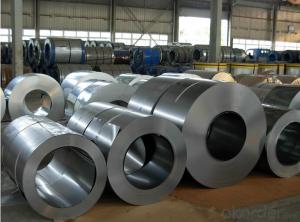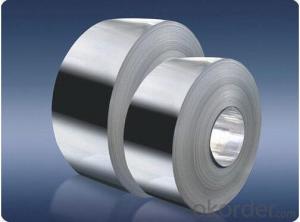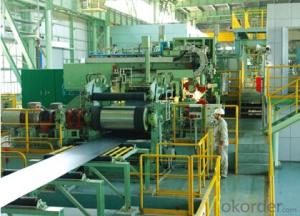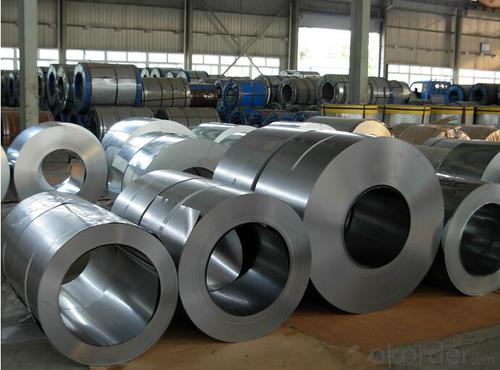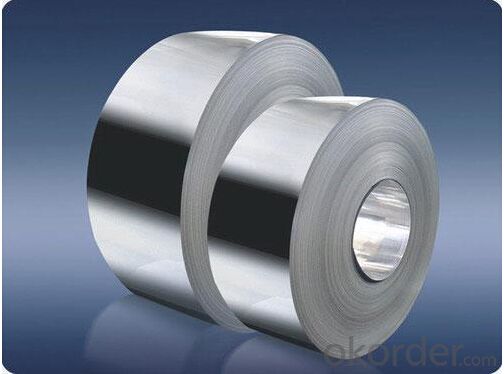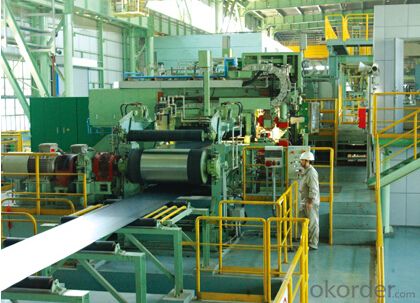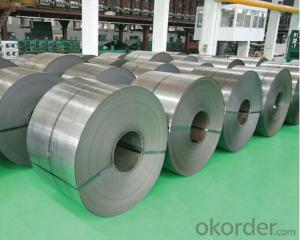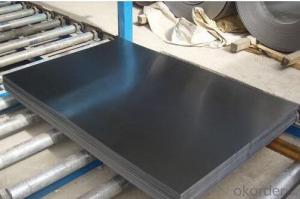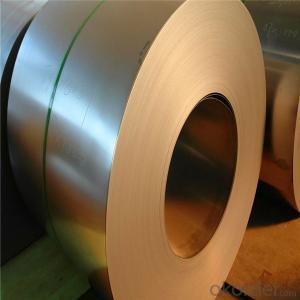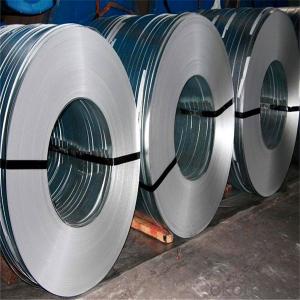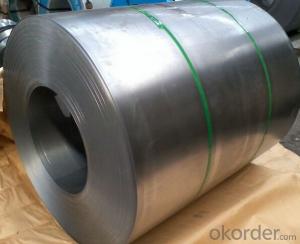Best Quality of Cold Rolled Steel Coil from China
- Loading Port:
- Tianjin
- Payment Terms:
- TT OR LC
- Min Order Qty:
- 100 m.t.
- Supply Capability:
- 5000 m.t./month
OKorder Service Pledge
OKorder Financial Service
You Might Also Like
1.Structure of Cold Rolled Steel Description:
The raw material of cold rolled steel coil/sheet is high quality hot rolled product, and after pickling continuous rolling, degreasing, annealing,skin pass,slitting and cut to length line etc. Along with it many kinds of new technology and new process of global cold rolling production have been applied. Therefore the quality of the goods could be guaranteed. The product is widely used in outdoor and interior decoration, furnishing manufacturing, home appliance, automobile etc.
2.Main Features of the Cold Rolled Steel:
• Excellent process capability
• Smooth and flat surface
• Workability, durability
• Excellent heat resistance performance
• High strength
• Good formability
• Good visual effect
3.Cold Rolled Steel Images
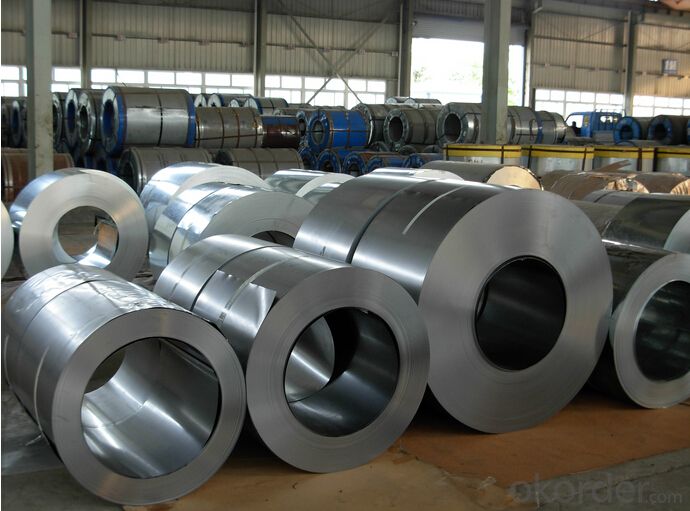
4.Cold Rolled Steel Specification
Standard:AISI,ASTM,DIN,GB,JIS,JIS G3302 ASTM 653M EN10142
Grade: Q195~Q345
Thickness: 0.16mm~1.5mm,0.16-1.5mm
Width: 1250,600-1250mm
Coil weight:3-12 MT
Coil ID:508/610mm
Chemical composition:
C | Si | Mn | Cr | Ni | P | S |
0.150 | 0.476 | 11.231 | 12.50 | 0.900 | 0.039 | 0.010
|
5.FAQ of Cold Rolled Steel
We have organized several common questions for our clients,may help you sincerely:
1.How about your company?
A world class manufacturer & supplier of castings forging in carbon steel and alloy steel,is one of the large-scale professional investment casting production bases in China,consisting of both casting foundry forging and machining factory. Annually more than 8000 tons Precision casting and forging parts are exported to markets in Europe,America and Japan. OEM casting and forging service available according to customer’s requirements.
2.How to guarantee the quality of the products?
We have established the international advanced quality management system,every link from raw material to final product we have strict quality test;We resolutely put an end to unqualified products flowing into the market. At the same time, we will provide necessary follow-up service assurance.
3. How long can we receive the product after purchase?
Usually within thirty working days after receiving buyer’s advance payment or LC. We will arrange the factory manufacturing as soon as possible. The cargo readiness usually takes 15-25 days, but the shipment will depend on the vessel situation.
- Q: How are steel sheets protected during welding?
- Steel sheets are protected during welding through a process called shielding. Shielding is essential to prevent the steel sheets from being exposed to oxygen and other atmospheric contaminants that can cause oxidation and impurities in the weld. There are various methods used to shield the steel sheets during welding. One common method is to use a shielding gas, such as argon or carbon dioxide, which is directed at the welding area to create a protective atmosphere. This gas displaces the surrounding oxygen, preventing it from reacting with the heated metal and causing oxidation. In addition to shielding gas, another method commonly employed is the use of flux. Flux is a substance that is applied to the joint area of the steel sheets prior to welding. It acts as a protective barrier, creating a molten slag that covers the weld and shields it from the atmosphere. Flux can be in the form of a powder, paste, or even a wire that is fed continuously during welding. Furthermore, some welding techniques, such as submerged arc welding, utilize a combination of both shielding gas and flux to provide optimal protection to the steel sheets. This technique involves the use of a granular flux that is fed continuously along with the welding wire. The flux melts and forms a protective layer over the weld, while the shielding gas prevents atmospheric contamination. Overall, the protection of steel sheets during welding is vital to ensure the quality and integrity of the weld. Shielding methods, such as shielding gas and flux, create a protective environment that prevents oxidation, impurities, and other defects from forming in the weld, resulting in a strong and durable joint between the steel sheets.
- Q: What is the maximum load-bearing capacity of steel sheets?
- The maximum load-bearing capacity of steel sheets depends on various factors such as the thickness, grade, and type of steel, as well as the specific application and support structure. Generally, steel sheets have high load-bearing capacities ranging from a few thousand pounds to several hundred thousand pounds per square inch, making them suitable for a wide range of structural and industrial applications.
- Q: How do steel sheets compare to other materials, such as aluminum or stainless steel?
- Steel sheets are generally stronger and more durable compared to aluminum or stainless steel. They offer better resistance to impact, corrosion, and extreme temperatures. Steel sheets are also more cost-effective and widely available, making them a popular choice in various industries. However, aluminum and stainless steel sheets have their own advantages, such as being lighter in weight and having better resistance to certain chemicals. Ultimately, the choice of material depends on the specific requirements of the application.
- Q: How do steel sheets handle thermal expansion?
- Thermal expansion is managed by steel sheets through their ability to expand and contract in response to temperature fluctuations. When steel is heated, it expands, and when it is cooled, it contracts, just like any other material. However, steel has a relatively low coefficient of thermal expansion compared to other materials, meaning it expands and contracts less for a given change in temperature. This characteristic makes steel sheets more resistant to warping or buckling caused by thermal expansion. Moreover, steel is a robust and long-lasting material, enabling it to withstand the stresses resulting from thermal expansion without significant damage. To further address the effects of thermal expansion, engineers often incorporate expansion joints into structures or employ techniques such as pre-stressing and anchoring to accommodate the expansion and prevent harm. As a result of these properties and design considerations, steel sheets are able to effectively manage thermal expansion.
- Q: Can steel sheets be used for decorative purposes?
- Yes, steel sheets can definitely be used for decorative purposes. They can be fabricated and shaped into various designs, patterns, and finishes, making them a versatile choice for architectural and interior applications. Steel sheets can add a sleek and modern aesthetic to spaces, whether used as wall cladding, partitions, ceilings, or furniture. Additionally, their durability and resistance to corrosion make them suitable for both indoor and outdoor decorative elements.
- Q: What are the different types of steel sheet finishes for architectural applications?
- Architectural applications commonly utilize various types of steel sheet finishes, each serving a different purpose. These finishes not only enhance the visual appeal of steel sheets but also offer protection against corrosion and environmental factors. 1. Mill Finish: The most basic type of finish, the steel sheet remains as it is from the mill. It has a dull, gray appearance and is typically used for applications where aesthetics are not a priority. 2. Brushed Finish: Also known as a satin finish, this type of finish is achieved by brushing the steel sheet with a fine abrasive material. It results in a smooth, linear texture, giving the surface a contemporary and elegant look. 3. Polished Finish: Achieved by polishing the steel sheet with abrasive materials, this finish creates a smooth and reflective surface. It offers a high-gloss, mirror-like appearance, making it suitable for applications that require a sophisticated and luxurious look. 4. Embossed Finish: This finish involves pressing the steel sheet with embossing tools to create textured patterns or designs on the surface. It provides a unique and decorative appearance, ideal for architectural applications that require visual interest. 5. Patterned Finish: This finish entails applying patterns or textures onto the steel sheet using techniques like etching, laser cutting, or perforating. It creates visually appealing surfaces with intricate designs, suitable for both functional and decorative purposes. 6. Powder Coated Finish: This finish involves electrostatically applying a layer of dry powder paint to the steel sheet, which is then cured under heat. It offers a durable and vibrant finish, available in a wide range of colors and textures. This finish is highly resistant to chipping, scratching, and fading, making it ideal for exterior architectural applications. 7. Galvanized Finish: This finish is achieved by applying a layer of zinc coating onto the steel sheet through galvanization. It provides excellent corrosion resistance, making it suitable for outdoor architectural applications exposed to harsh environments. In conclusion, the choice of steel sheet finish depends on the desired aesthetics, durability, and environmental conditions of the architectural application.
- Q: Can steel sheets be used for manufacturing industrial shelving?
- Yes, steel sheets can be used for manufacturing industrial shelving. Steel sheets are known for their strength and durability, making them an ideal material for heavy-duty applications such as industrial shelving. They can withstand heavy loads and provide stability and support to the shelving units. Additionally, steel sheets can be easily fabricated and customized to meet specific dimensions and requirements. They also have a high resistance to corrosion, which is important in industrial environments where exposure to moisture, chemicals, and other harsh conditions is common. Overall, steel sheets offer a reliable and long-lasting solution for manufacturing industrial shelving.
- Q: How are steel sheets protected against rusting?
- Steel sheets are protected against rusting through a process called corrosion protection. There are several methods used to protect steel sheets from rust, including: 1. Galvanization: This process involves coating the steel sheets with a layer of zinc. Zinc acts as a sacrificial anode, meaning it corrodes in place of the steel when exposed to moisture or oxygen. This creates a barrier that protects the steel from rusting. 2. Painting: Applying a layer of paint to steel sheets acts as a protective barrier against moisture and oxygen. The paint creates a physical barrier that prevents these elements from coming into contact with the steel, thus reducing the risk of rust formation. 3. Powder coating: Powder coating involves applying a dry powder to the steel sheets and then heating it to form a protective layer. The powder melts and fuses into a smooth coating, providing excellent resistance to rust and corrosion. 4. Electroplating: This method involves immersing the steel sheets in a bath containing a metal coating solution, such as zinc or chromium. An electric current is then passed through the bath, causing the metal coating to bond with the steel. This electroplated layer acts as a protective barrier against rust. 5. Phosphating: Phosphating is a chemical process where a layer of zinc or manganese phosphate is deposited on the steel sheets. This layer enhances the adhesion of paint or other coatings, providing a corrosion-resistant surface. These methods are commonly used in various industries to protect steel sheets from rusting. The specific method chosen depends on factors such as cost, durability requirements, and the environment in which the steel sheets will be used.
- Q: Are the steel sheets suitable for water tank fabrication?
- Yes, steel sheets are suitable for water tank fabrication. Steel is a strong and durable material that can withstand the weight of water and provide structural support. It is also resistant to corrosion when properly coated or treated, ensuring that the water stored in the tank remains clean and uncontaminated. Additionally, steel sheets can be easily molded and shaped to meet specific design requirements for water tanks. Overall, steel sheets are a reliable and commonly used material for water tank fabrication.
- Q: Can steel sheets be recycled after use?
- Yes, steel sheets can be recycled after use. Steel is a highly recyclable material, and recycling steel sheets helps to conserve energy and reduce the need for raw materials in steel production.
Send your message to us
Best Quality of Cold Rolled Steel Coil from China
- Loading Port:
- Tianjin
- Payment Terms:
- TT OR LC
- Min Order Qty:
- 100 m.t.
- Supply Capability:
- 5000 m.t./month
OKorder Service Pledge
OKorder Financial Service
Similar products
Hot products
Hot Searches
Related keywords
